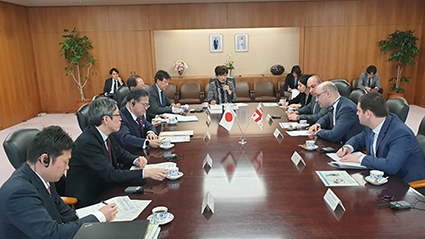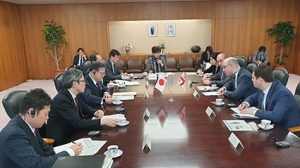Georgian, Japanese Ministers Discuss Economic Cooperation
Trade and economic relations between Georgia and Japan, with special emphasis on bilateral trade, were discussed in detail during the meeting of the Ministers of Economy of Georgia and Japan in Tokyo last week.
Giorgi Kobulia and Hiroshige Seko discussed a wide range of bilateral economic and trade relations within the framework of Prime Minister Mamuka Bakhtadze’s official working visit to Japan.
It was noted that in 2018 the export volume was increased by 55%, highlighting that the potential of further development in this direction is still vast.
The sides also mentioned the export of Georgian wine to Japan, which increased by 28% last year.
An agreement between Georgia and the Japanese Export and Investment Insurance Company (NEXI), signed on March 15, was also part of the conversation. It was noted that the Agreement will stimulate the growth of trade of Japanese and Georgian goods and services and encourage Japanese investment to enter Georgia.
Kobulia drew attention to the launch of negotiations on a Georgian-Japan Free Trade Agreement and offered his Japanese counterpart the chance to promptly start the preparation process. The benefits of the agreement on cooperation in the field of investment, which is almost complete, were also emphasized during the conversation. The ministers expressed readiness to complete the remaining formal procedures quickly.
The Japanese Minister also highlighted the possibility of launching negotiations on a Free Trade Agreement between Georgia and Japan as a further step of cooperation.
Kobulia introduced the energy sector reforms in Georgia and suggested Japanese companies participate in an audit of the major industrial energy enterprises in Georgia, provide consultations on technical support and share experience in elaborating the energy efficiency implementation plan.
The Georgian side offered the Japanese the chance to participate in the implementation of two energy projects – construction of a 230-250 MW combined cycle thermal power plant and a 50 MW power plant.
Other renewable energy sources such as wind, solar, geothermal and biomass energy were also named as fields for expanding cooperation between the two countries.
The ministers also positively evaluated the Georgian wine exhibition which opened in Tokyo on March 15 and will last until May 7.
The exhibition is about Georgian viniculture and history and it, with its concept drawing on showcasing Georgia's millennia-old viniculture, brings together unique archeological artifacts and modern technologies.
The Japanese partners' major contribution involves using the latest WarpSquare technology to bring to life Georgian culture and winemaking history, enabling visitors to travel to the most ancient homeland of winemaking through virtual interaction.
The Georgia-Homeland of Wine project, along with the exhibition, includes seminars on the origins and uniqueness of Georgian wine delivered by celebrated global experts, also winetasting sessions, master classes on the Georgian supra – a festive table, and a cultural program.
The implementation of the Georgia-Homeland of Wine project started in 2017, at the Bordeaux Center for Wine and Civilizations, France, and involved a scientific study, based on which the scientific community recognized Georgia as the cradle of wine.
By Thea Morrison
Image source: Ministry of Economics of Georgia











